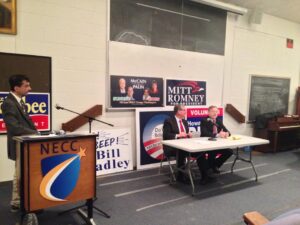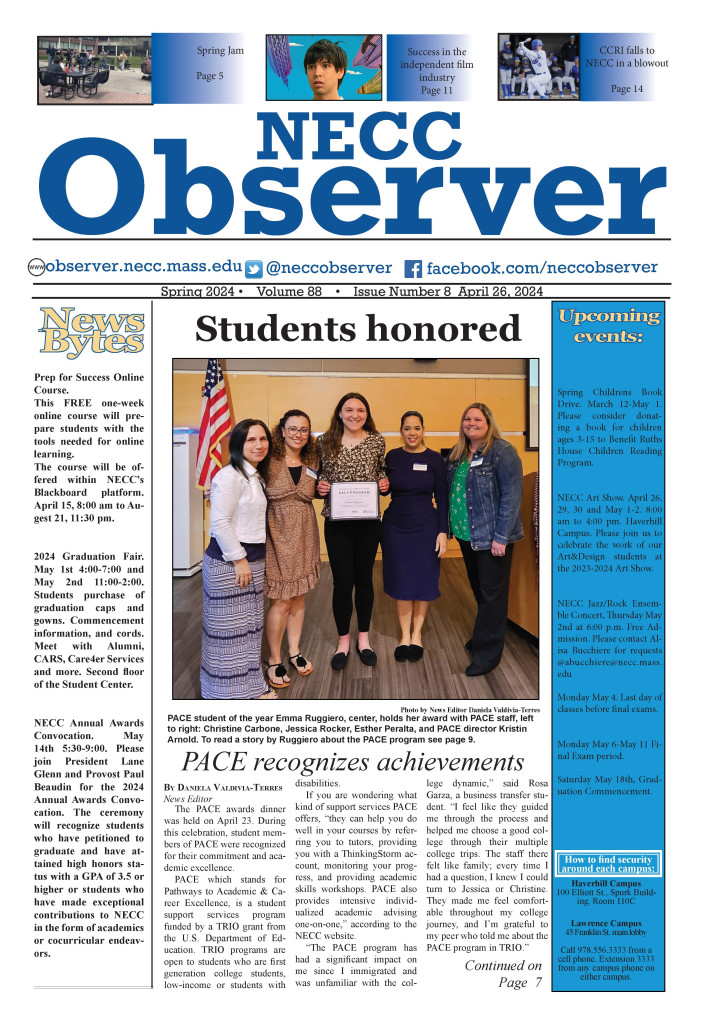Editor’s note: corrections have been applied to original print story.
Accessibility is important in education to guarantee all students have equal opportunities to learn. Deaf and Hard of Hearing Services at NECC strives to do just that — ensure that all students are comfortable and have what they need to succeed.
Deb McKinney is the manager for deaf and hard of hearing services at NECC.
“[We provide] communications access for deaf and hard of hearing students and staff [and faculty],” she signed.
The department works to provide interpreters for “classes, meetings, activities, student center, faculty one on one with students, for tutoring, supplemental instruction — basically all services.”
The department also works with Learning Accommodations, Enrollment Services and CPAC to make sure there’s smooth transitions and helps set up note takers for deaf students and extended testing times if they need it.
“It’s hard to take notes and watch the interpreter at the same time,” signed McKinney.
One type of communication accommodation the program provides, along with interpreters, is CART or Communication Access Realtime Translation. CART allows for all dialogue at events to be typed so that deaf and hard of hearing attendees can know what is being said at the event.
“[We] provided CART for the first time at graduation services [last] year,” signed McKinney.
“Most things are very positive,” signed McKinney. “I’m in my seventh year — there’s more faculty awareness, accessibility.”
NECC also has a class to teach English to deaf and hard of hearing students.
A separate department, Learning Accommodations, also works to provide other types of communication accommodation, including JAWS, or Job Access with Speech, which is a program that allows students with vision loss or blind students to “listen to descriptions about the environment and use it to visually hear what’s going on.”
An area of improvement for NECC would be providing more closed captioning — there’s not enough throughout the campus.
Closed captioning allows for deaf and hard of hearing students to read the audio in a video, and it needs to be made more widely available in classes, class activities, and even more showing small video at events like convocation.
“Communication access as a whole is pretty good,” signed McKinney. “It’s nice here — it’s a community college … there’s support, but it takes a while to educate people. For a small community, there’s a lot of people.”
Deb McKinney is on several committees at NECC working for accommodations and access including the ADA Access Committee, Access media committee, Diversity and Cultural Committee, Academic Goal Team 3 and the Student Advisory Committee.
Dena Riccio-Enis is in charge of interpreting and communication access services. She makes sure interpreters are available and she assigns and schedules them.
Riccio-Enis compiles information on how to work with interpreters for faculty, staff and students, “information on how to work with interpreters, especially in a college environment.”
“Along with that packet, I email faculty and let them know they’re going to have a learning accommodation student,” said Riccio-Enis.
There are 10 to 15 freelance interpreters contracted per semester at NECC, depending on the semester.
Another program that focus on deaf services at NECC include Gallaudet University Regional Center (GURC) which states on their website that “Gallaudet University, federally chartered in 1864, is a bilingual, diverse, multicultural institution of higher education that ensures the intellectual and professional advancement of deaf and hard of hearing individuals through American Sign Language and English.”
GURC also strives to educate parents of deaf and hard of hearing children.
Riccio-Enis and McKinney also ensure that deaf and hard of hearing students can get communications access for community events and clubs on campus.
“We automatically get interpreters for all college assemblies, presidents meetings, convocation, graduation, awards night and professional development days,” signed McKinney.
If a club is hosting a meeting or event, they are required to post a communication accommodation notice on the bottom of their fliers. If a deaf or hard of hearing students contacts the host of the event, it is the host’s responsibility to ensure there is an interpreter present at the meeting.
The link to request interpreting sevices can be found at bit.ly/1vsVEUU by clicking the logo displayed.
(necc.mass.edu/academics/support-services/learning-accommodations/deaf-and-hard-of-hearing-services/interpreting-services/ )
The communication accommodations department also does awareness training and presentations, and workshops on deaf culture and communication access.
For more information, contact Deb McKinney at dmckinney@necc.mass.edu, or Dena Riccio-Enis at driccioenis@necc.mass.edu



